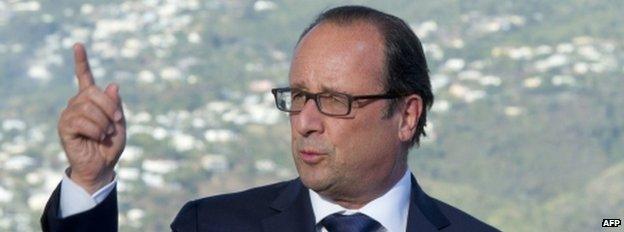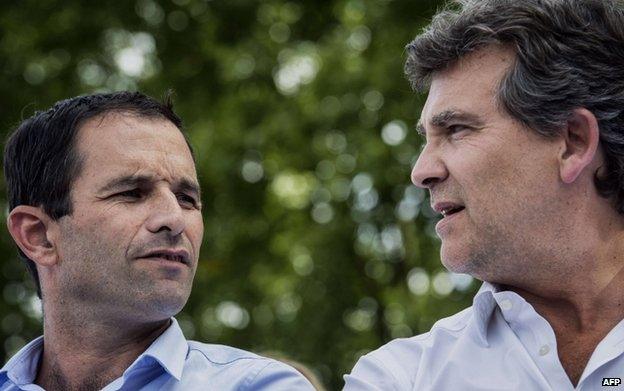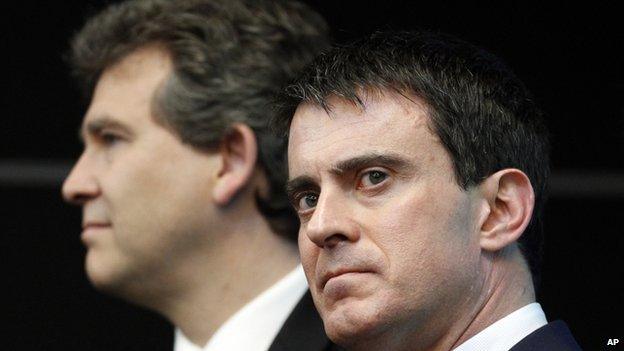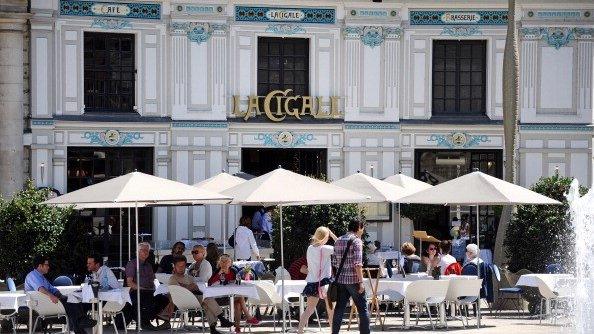French ministers resign in economy row
- Published
France's left-wing and right-wing papers are carrying the same "crisis in the regime" headline, as Lucy Williamson reports
France's economy minister says he and two colleagues are leaving their posts amid a bitter row over economic policy.
Arnaud Montebourg had publicly urged President Hollande's government to end austerity policies and focus on growth.
He was backed by Education Minister Benoit Hamon and Culture Minister Aurelie Filippetti.
Prime Minister Manuel Valls accused Mr Montebourg of crossing "a yellow line" and announced the resignation of his entire cabinet.
The move had apparently been agreed with President Francois Hollande, who immediately asked him to form a new government on Tuesday "consistent with the direction" he had set for the country.
France is struggling with high unemployment and low growth and President Francois Hollande's popularity is the lowest for a president in more than 50 years.
Mr Montebourg told a news conference later on Monday he thought it necessary to speak out to try to avert the European Union's "descent into hell".
"I informed the prime minister.... that if he deemed my convictions counter to the direction of the government he leads, then in that case I thought it necessary for me to be let go."
Mr Hamon and Ms Filippetti had made the same choice, he added.


Hollande purges rebels - Lucy Williamson, BBC News, Paris
Francois Hollande is sending a clear message: dissenters within the party will not be tolerated at this difficult economic moment.
But the decision to dissolve the government is also a sign of how much is at stake for him.
With unemployment running at more than 10%, growth stagnant, and polls suggesting that less than 20% of voters think he can turn the economy around, Mr Hollande is facing a difficult autumn.
His plan has been to cut spending in order to fund tax cuts for business, in the hope of boosting the economy, but there are those in his party who disagree.
They want less focus on austerity, and more money funnelled direct to households. Purging the rebels is an eye-catching move, but with his popularity at an all-time low, Mr Hollande cannot afford to look weak.

Mr Montebourg, 51, is on the left wing of the governing Socialist party, and has campaigned against globalisation.
He came third in the party's contest for presidential candidate in 2011.
He told Le Monde newspaper that Germany was trapped in an austerity policy that it had imposed across Europe and spoke at a meeting with Mr Hamon in eastern France on Sunday, with the support of Culture Minister Aurelie Filippetti.
Mr Hamon called on Sunday for a revival in demand, and for an end to German Chancellor Angela Merkel setting Europe's direction.

Arnaud Montebourg (R) and Benoit Hamon (L) have both criticised France's economic direction

Manuel Valls was appointed prime minister in March after the ruling Socialists saw poor election results
Manuel Valls became prime minister in March, replacing Jean-Marc Ayrault, after a poor performance by President Hollande's Socialist party in local elections.
Earlier this month the French government admitted it would be impossible to reach a previous growth forecast of 1%.
Germany saw its economy shrink by 0.2% between April and June.
Mr Hollande's political opponents have been quick to round on the president:
The head of the centre-right UMP opposition, Luc Chatel, complained of a "grave political crisis" that was weakening the country
National Front leader Marine Le Pen said the president should dissolve the National Assembly and call elections
Left-wing Green politician Eva Joly denounced Mr Hollande's and Mr Valls's economic policies, arguing they were "governing against their majority".
Mr Hollande's poll ratings have sunk to 17%, while Mr Valls' have dropped to 36%, according to an Ifop poll published on Sunday.
- Published21 August 2014

- Published14 August 2014